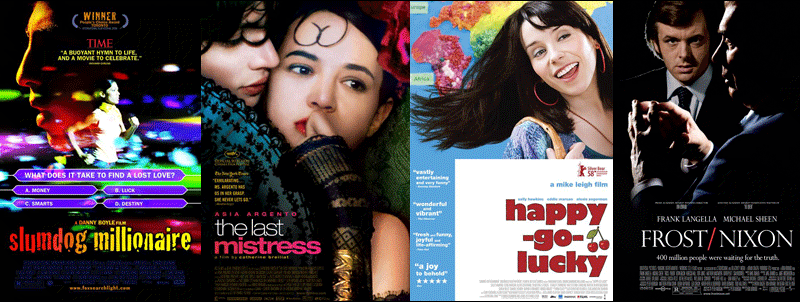“Doubt”-Taking place in a Catholic school in the Bronx in 1964, and based on the Broadway play of the same name by director and screenwriter John Patrick Shanley, who grew up in that neighborhood, “Doubt” contains some of the finest acting you will see in a long time. Meryl Streep is simply brilliant as Sister Aloysius Beauvier, the principal of the school, who seems to spend all of her time looking for trouble and whose approach to life is ultra-strict and full of absolutism. Philip Seymour Hoffman is marvelous as Father Brendan Flynn, the local parish priest who has a more humane view of what the Church should be doing and tries to ease the life at school of a young friendless boy, Donald Miller, the first black student there. I guarantee that you will never see better performances by two actors than when Streep and Hoffman are together in one scene battling each other verbally. When the somewhat innocent Sister James (the delightful Amy Adams), sees a few things at the school concerning Donald Miller that don’t seem right to her, she brings her concerns to Sister Aloysius who becomes convinced, with absolute moral certainty, that there is something inappropriate going on. After being confronted, Father Flynn stirs the congregation with a sermon on the subject of “doubt.” “Doubt” is a multi-themed story about the approach of the Sisters of Charity at a Catholic school; the role of the Church in a modernizing world; the issue of child abuse by priests; and the conflict between true belief and humanity that's represented by the approaches of Sister Aloysius and Father Flynn. However, it should be noted that while it can't be certain that this was intended by John Patrick Shanley, the title in the context of a story about priests and nuns in a Catholic school, can also raise the intriguing question of the basis of faith, and whether, considering the Church's crusading, inquisitional and missionary history, and Sister Aloysius' approach, the true title of this film should have been "Certainty." "Doubt" also contains the brilliant, albeit brief, performance of Viola Davis as Donald Miller’s mother. When Mrs. Miller and Sister Aloysius converse on a walk from the school to nearby Parkchester, where Mrs. Miller works, sparks almost literally fly. Although the ending of the film is peculiar in light of the portrayals of the characters in the rest of the story, the overall effect of “Doubt” is stunning, both in theme and especially in performance. Beautifully photographed by the great cinematographer Roger Deakins, and perfectly compact in its presentation, my biggest criticism of the film is that I would have liked to have seen a few more people in the outdoor Bronx scenes. This is one film not to be missed. A (4/10/09) “Let The Right One In”-Vampire movies are not really my thing, but I was intrigued by the favorable reviews this Swedish film had received. Beautifully photographed in a snow-covered Swedish town, “Let The Right One In” is the story of a unique attachment between two “youngsters.” Oskar (Kåre Hedebrant) is a lonely 12-year old boy being picked on by bullies at school, but who, despite carrying a knife, can only imagine the courage to get back at them. One day he meets a strange young neighbor, Eli (Lina Leandersson), who tells him that she is 12, “more or less.” But we soon realize that Eli is hardly a typical 12-year old girl, as the man with whom she lives kills a young boy to harvest blood for her, and then forgets to bring the blood home when he is interrupted in the middle of his act. Eli is forced to kill a popular local man for his blood at the same time that she is trying to encourage Oskar to stand up to the bullies. “Let The Right One In” doesn’t exactly provide a positive theme for young viewers, but it does offer us an intelligent and well-acted tale about this unusual friendship. Kåre Hedebrant is fine as young Oskar, but it is Lina Leandersson, looking slightly disheveled most of the time, who steals the film with just the right look and approach to the role of a thirsty but nice vampire in the form of a young girl. B+ (4/10/09) | |









